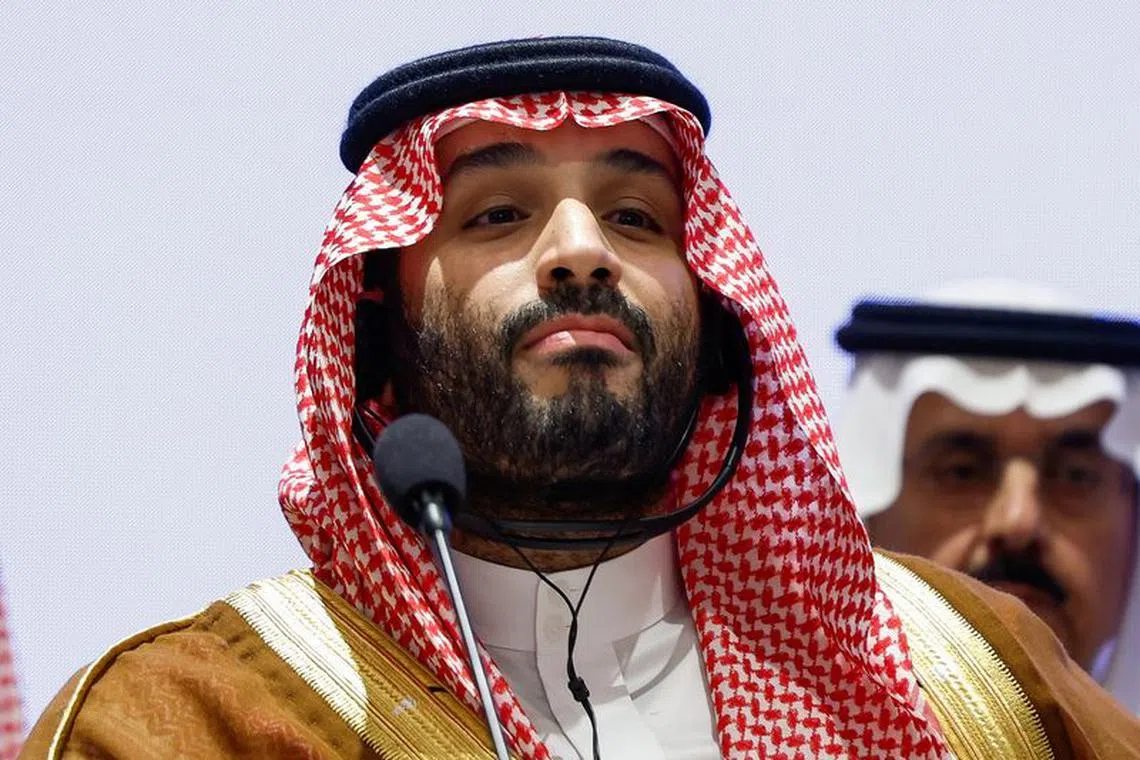Saudi Crown Prince says kingdom getting ‘closer’ to normalising Israel ties: Fox interview
Sign up now: Get ST's newsletters delivered to your inbox

Crown Prince Mohammed bin Salman also voiced concern about the possibility that Iran could obtain a nuclear weapon.
PHOTO: REUTERS
WASHINGTON - Saudi Arabian Crown Prince Mohammed bin Salman said in a United States television interview that his country was moving steadily closer to normalising relations with Israel and also warned that if Iran gets a nuclear weapon, “we have to get one”.
“Every day, we get closer,” the Crown Prince told Fox News, according to excerpts of an interview to be shown later on Wednesday, when asked to characterise talks aimed at long-time foes Israel and Saudi Arabia reaching a landmark agreement to open diplomatic relations.
The conservative US network’s interview with the Crown Prince, widely known as MBS, comes as President Joe Biden’s administration presses ahead with an effort to broker historic ties between the two regional powerhouses, Washington’s top Middle East allies.
The normalisation talks are the centrepiece of complex negotiations that also include discussions of US security guarantees and civilian nuclear help that Riyadh has sought, as well as possible Israeli concessions to the Palestinians.
“For us, the Palestinian issue is very important. We need to solve that part,” Prince Mohammed, Saudi Arabia’s de facto ruler, said when asked what it would take to get a normalisation agreement.
“And we have a good negotiations strategy till now. We’ve got to see where we go. We hope that will reach a place that will ease the life of the Palestinians and get Israel as a player in the Middle East,” he said, speaking in English.
Prince Mohammed also voiced concern about the possibility that Iran, a mutual adversary of Saudi Arabia and Israel that the US wants to contain, could obtain a nuclear weapon. Teheran has denied seeking a nuclear bomb.
“That’s a bad move,” he said. “If you use it, you’ve got to have a big fight with the rest of the world.”
Asked what would happen if Iran did get a nuclear bomb, he said: “If they get one, we have to get one.”
Potential benefits of mega-deal
While US officials insist any breakthrough is far away and steep obstacles remain, they privately tout the potential benefits of a regional mega-deal.
These include removing a possible flashpoint in the Arab-Israeli conflict, strengthening the bulwark against Iran and countering China’s inroads in the Gulf. Mr Biden would also score a foreign policy win as he seeks re-election in November 2024.
The broadcast of the Crown Prince’s comments was scheduled for the same day as a meeting between Mr Biden and Israeli Prime Minister Benjamin Netanyahu, in which they pledged to work together towards Israeli-Saudi normalisation, which could reshape the geopolitics of the Middle East.
Both leaders on Wednesday also said Iran could not be allowed to acquire a nuclear weapon.
Prince Mohammed issued the stark warning to Iran despite the two countries having agreed in Chinese-brokered talks in March to restore relations after years of hostility.
Among the challenges the US faces in brokering a wide-ranging deal would be satisfying Prince Mohammed’s demands. He is reported to be seeking a treaty committing the US to defend the kingdom if attacked, and also wants advanced weapons and assistance for a civilian nuclear programme.
From the Israelis, Prince Mohammed is seeking significant concessions to the Palestinians to keep alive prospects for statehood in the occupied territories, something Mr Biden is also pushing for but which Mr Netanyahu’s far-right government has shown little willingness to grant.
There is a growing a sense of urgency in Washington over China’s effort to gain a strategic foothold in Saudi Arabia, the world’s top oil exporter. The administration also seeks to further heal ties with Riyadh, which Mr Biden once vowed to make a “pariah” over its human rights record.
But an upgraded US-Saudi security relationship would face resistance in the US Congress, where many are critical of Prince Mohammed over the 2018 killing of Saudi journalist Jamal Khashoggi,


